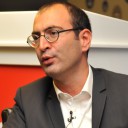CIVICUS and its partners organized International Civil Society Week (ICSW) in Johannesburg between 19 and 25 November. In a week of meetings and workshops in the heartland of Africa, a total of 700 activists and civil society leaders from more than 100 countries discussed #post2015 agenda, #CitizenAction and #PeoplesPower along with other pressing social issues of our day. International Civil Society Week was not only a platform for inspiring interactions and thought-provoking discussions but also a joyful celebration of South Africa’s 20th anniversary of freedom and democracy.
Shrinking civic space was a recurring and common theme. Many activists referred to different regulations implemented by governments and expressed growing anxiety for the future of civil society and fundamental rights and liberties. It is probably because of this growing pressure that many activists and CSOs find innovative ways for civic space. Arts and music, video games and different campaigns are only some of the tools used by these inspiring activists. In many cases internet technologies help them attract attention and keep these spaces vibrant for a more enabling environment.
Without any doubt, the Tunisian blogger, women’s rights and peace activist Aya Chebbi’s criticisms of organized and professionalized civil society summed up the conference. The issues she raised were previously raised by CIVICUS in its Open Letter to Activists. In an environment where CSOs are bound by financial constraints, donor frameworks and UN processes, said Chebbi, civil society has become more isolated and disconnected as it has become more professionalized. It is worth mentioning that this is neither a new discussion nor one that has an easy way out. Yet, it is an essential discussion if we are to question our understanding of civil society and our role in it.
Many of you may recall the Gezi Movement which started in the heart of Istanbul in May 2013 and later spread to 79 of Turkey’s cities: 2.5 million of Turkey’s almost 77 million population participated in the protests and demonstrations. Among many others, a striking figure concerning civil society came from research that was done on Gezi Park in 6-8 June 2013. The researchers asked 4,411 protesters about their affiliations with any political party, association, foundation or platform: 78.9 per cent of participants said they had none. Considering young people between the ages of 21 and 30 made up more than 50 per cent of the respondents, Chebbi’s criticisms and questioning become quite relevant for the Turkish case and elsewhere as well.
With a growing number of mass demonstrations all around the world, are CSOs growing apart from the general public? The question of whether CSOs can overcome the challenge of pressing social issues by going back to their grassroots and voluntary-based background without getting trapped in professionalism was smartly and provocatively discussed.
Funding is always vital but not the sexiest topic. Participants also had the chance to listen to big donor organizations in a session named ‘The Changing Nature of Civil Society Resourcing’. The changing funding strategies of donors in parallel with what is going on in the world were deeply criticized, and donors were challenged to leave their ‘airconditioned plaza rooms’ to understand the very basic roots of civil society, especially working in rural areas.
It was clear that CIVICUS’s young and enthusiastic team, under the successful leadership of Danny Sriskandarajah, has already achieved a lot. Coming projects of CIVICUS and the new and expanding role of AGNA were some of the highlights of this year’s conference. But more important than everything, South Africa showed participants the greatest hospitality, not only shaking their brains with new ideas but giving them a sincere farewell with lots of music, dance and hope. The closing show by Hugh Masakela not only touched our hearts but showed us all that freedom and democracy is still possible!
Tevfik Başak Ersen is secretary general of the Third Sector Foundation of Turkey (TUSEV).






Comments (0)